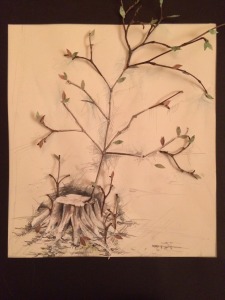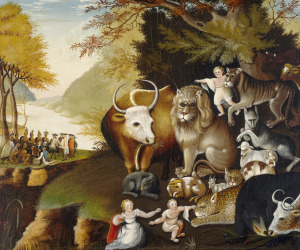Readings: Psalm 126, Isaiah 19:18-25, 2 Peter 1:2-15
“When the Lord brought back
The captive ones of Zion,
We were like those who dream.” Psalm. 126.1
“On that day there will be a highway from Egypt to Assyria, and the Assyrian will come into Egypt, and the Egyptian into Assyria, and the Egyptians will worship with the Assyrians. On that day Israel will be the third with Egypt and Assyria, a blessing in the midst of the earth, whom the Lord of hosts has blessed, saying, ‘Blessed be Egypt my people, and Assyria the work of my hands, and Israel my heritage.’” Isaiah 19: 23, 24.
More than one prophet from the major religious traditions, including the Dalai Lama, has said, “When there is peace among religions there will be peace in the world.” Yet there cannot be peace among religions so long as the religious fail to understand we are all in spiritual exile. The members of one tribe, brazenly putting on the mantle of the One True Tribe which has found the One True God, seem determined to convert all the other tribes to their own way of believing, even to the point of death. There is no winning the argument against such a proposition except to question the underlying assumptions that the tribe is asserting, but that only leads to anger and violence. Tribal consciousness demands that the tribe defend the boundaries and beliefs of its own group. And so, tribal warfare wages on today as it has for thousands of years.
The major traditions teach peace but it seems so few know the ways of their Redeemer or heed the words of their Prophets, which transcend tribal consciousness. Even those who are enlightened often slip back into their old patterns and ways of seeing and believing, which are entirely ego centered. As Br. David Steindl-Rast says, “Waking up is a continuous process.”
Dietrich Bonhoeffer said, “The joy of God (for Christians) has been through the poverty of the crib and the distress of the cross. It does not deny the distress where it is, but finds God in the midst of it, indeed precisely there. It does not contest the most egregious sin, but finds forgiveness in just this way. It looks death in the face, yet finds life in death itself.” The cross is the perfect metaphor for what the soul must go through to become fully human, as Eckart Tolle likes to say.
Until I am able to recognize and admit MY OWN negative emotional patterns and constant craving for security, power, control, attention, esteem, possession or even meeting the demands of my own tribe, I remain in spiritual exile, unable or unwilling to understand and accept another’s point of view. But if I meet my Christ precisely there, and allow the Source of all Being to spiritually heal me from the demands of my false self, over time I begin to find my heart center where the light of peace and love and joy dwells. When Christ consciousness forms in me then I am able to recognize and honor the Christ mystery in another, no matter his or her cultural or religious tradition.
There’s a story from “Tales of a Magic Monastery” by Theophane the Monk in which a group of people are questioning a wise old monk and he is providing sage advice. Finally someone asks, “Father, could you tell us something about yourself?” He leaned back. “Myself?” he mused. There was a long pause. “My name used to be …Me,” he answered. “But now it’s…You.”
“May our ears hear the Good. May our eyes see the Good. May we serve Him with the whole strength of our bodies. May we, all our life, carry out His will. May peace and peace and peace be everywhere.” (From the Mundaka Upanishad).
Offered by Bryan Fredrickson, gentle soul, interpreter of law, child of God.


